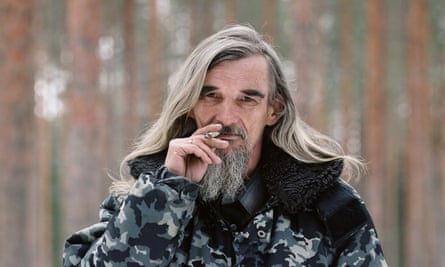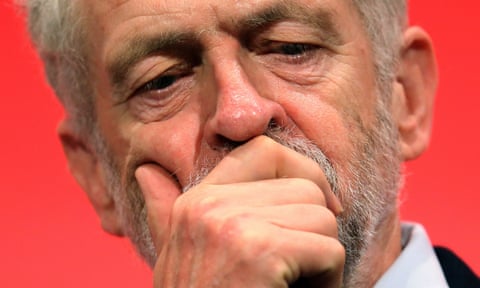Top story: Labour leader under pressure to censure Máduro
Good morning – Warren Murray here to help you get on top of UK and world news.
Jeremy Corbyn is facing calls from within Labour ranks to denounce Venezuela’s President Nicolás Maduro and his socialist government over the increasing repression and deteriorating situation in the country.
Maduro’s government just won a poll allowing it to rewrite the constitution but his mandate to do so is in dispute. The opposition boycotted the vote and two of its leaders have since been arrested; the EU has condemned the circumstances around the poll including “excessive and disproportionate use of force” by security forces; and a British company that provided voting technology says the result was inflated by at least a million votes. There have been months of deadly protests amid food and medicine price rises that are being driven by the steep dive in the price of oil – overwhelmingly Venezuela’s biggest export.
Corbyn once described Maduro’s predecessor, Hugo Chávez, as “an inspiration” in the fight against neoliberalism, and spoke to Maduro on live TV to congratulate him after he took over. Last night on the BBC’s Newsnight, the Labour shadow home office minister Chris Williamson criticised American sanctions against Maduro’s government and accused the US of fuelling unrest by funding opposition groups. Others in Corbyn’s shadow cabinet have also historically supported the socialist Venezuelan government.
Yesterday, Labour’s shadow foreign affairs secretary Emily Thornberry called for Venezuela’s government to “respect human rights and the rule of law”, and for Maduro to answer international concerns about his “increasingly authoritarian rule”. But the Labour MP Angela Smith said party leadership needed to go further: “I think Corbyn needs to condemn the actions of the Venezuelan regime, which are a very serious threat to democracy in that country.”
A spokesman said Corbyn was “watching the situation and developments in Venezuela closely”.
Oxford link in US murder – A worker from Somerville College at Oxford University is being hunted by Chicago police over a stabbing death. Andrew Warren, 56, is wanted along with Wyndham Lathem, 42, a microbiology professor at Northwestern University in Illinois. Chicago police have said they are suspected of involvement in the death of Trenton Cornell-Duranleau, who was found stabbed to death in Lathem’s apartment on 27 July. Police said it may have been a “domestic incident”. Warren is in charge of payroll and pensions at Somerville College, according to details from the web. Oxford said it would provide any assistance required by authorities in the “extremely concerning” case.
Gene editing – Scientists working in the US have deleted DNA that causes heart failure from a human embryo. It is the first time such an experiment has succeeded outside China. A tool known as Crispr was used to take out the gene for hypertrophic cardiomyopathy, or HCM. The embryos were never implanted, and it is unclear scientifically, legally and ethically whether the technique could ever be used to create babies. But the advance, by a US-South Korean team, has impressed other researchers. “This brings it closer to clinic but there’s still a lot of work to do,” said Richard Hynes, an MIT geneticist and expert on human genome editing.
Death by ‘wet bulb’ – Humid heatwaves that kill even healthy people within hours will begin blasting parts of the planet by the end of the century if climate change is not arrested, according to new research. The Indian subcontinent is on the front line of the threat. A study led by MIT predicts that the “wet bulb” temperature (WBT) – a combined measure of heat and humidity – will by 2071 start spiking above the level at which the human body can cool itself by sweating. Sticking roughly to the Paris climate accord targets would avert this worst-case scenario, say the scientists (remembering of course that Donald Trump recently opted America out).
Green & Black’s grey area – Important news for the ethically discerning chocoholic today as the Green & Black’s brand launches its first ever product that is not certified organic or Fairtrade. The Velvet Edition bar will instead carry the Cocoa Life certification. It is all a bit confusing – Fairtrade is actually a partner of the Cocoa Life programme, but farmers don’t get Fairtrade terms. “Supply chain” issues are cited by both Fairtrade and Green & Black’s as one reason for the introduction of Cocoa Life, with the new scheme apparently geared towards boosting cocoa production in developing countries. But Oxfam GB and the Co-op have expressed concern about potential confusion. “With the Fairtrade mark on products, consumers are clear about what they are getting,” said Rachel Wilshaw, Oxfam GB’s ethical trade manager.
We need your help to keep doing this …
The Guardian Morning Briefing is yours for free, but the journalism behind it has to be paid for. You have probably seen or heard about falling advertising revenues, and the impact on the media. That’s why we are asking people to become Guardian members and help secure our long-term future. It’s easy to join as a monthly supporter or even just make a one-off contribution. It feels great too. Hope you can help – thanks for reading.
Thinner cream for fat cats – FTSE100 executive pay fell by 17% last year, but don’t get too excited just yet. Those CEOs are still raking in 129 times the earnings of their average employee. In 1998 it was more like 47 times. Still, it’s a sign, writes financial editor Nils Pratley, that boardrooms are rattled by threats from Westminster to put workers on remuneration committees, make pay ratios public and introduce annual binding votes on pay. Companies may have trimmed bosses’ pay in the hope that Theresa May’s government will soften these anticipated measures – but the case for them remains compelling, Nils argues in his column today.
Ethics of ‘sharenting’ – Think again before Facebooking that phone footage of your little one adorably smearing Weetabix around the highchair tray. More than half of UK parents don’t agree with “sharenting” – putting video or photos of their young ones on social media – mostly because they want to preserve their children’s privacy. Among those parents who do share, only around half say their children are happy for them to do so. An Ofcom report has gone into how social media is affecting the lives of children, teenagers and young adults. Among concerns are pressure to keep up a good appearance online – and feelings of personal inadequacy, especially among young adults, because selfies and Instagram snaps give a “rose-tinted” view of others’ lives. The ability of users to edit imperfections out of their photos before posting fuels these perceptions.
Lunchtime read: Grave hunter who became the hunted
Face down in sandy graves, thousands of political prisoners were shot, killed and buried in a Russian forest near the Finnish border during Joseph Stalin’s “Great Terror” of 1937-8. Now the man who has worked tirelessly to memorialise those victims is himself the target of what supporters claim is a modern-day purge by Vladimir Putin’s government.

Yury Dmitriyev began uncovering the graves of Sandormokh in 1997, working with Memorial, Russia’s oldest human rights organisation. But their work has become unpopular amid a wave of nationalism that has accompanied Russia’s worsening international pariah status. Dmitriyev is now on trial accused of possessing child pornography. His defenders say they are innocent photographs documenting his adopted daughter’s growth. The arrest came soon after Russian media started denouncing Memorial for “aiming to destroy the Russian state”. Stalin may be gone, but he is a popular figure in Russia again – and the Kremlin’s new leadership would prefer to keep the truths of his era buried.
Sport
Whatever happened to financial fair play? It seems a fair question to pose at a time when Neymar appears set to complete a world-record move to Paris Saint-Germain in a mind-boggling deal worth around £450m in fees and wages.
Mark Sampson’s ultimate ambition is to turn his England players into the best team in the world, but first he can take a major step towards conquering Europe tonight when the Lionesses face Holland in the semi-final of Euro 2017.
Vernon Philander has admitted South Africa “had a few hard chats” after their 239-run defeat in the third Test, with the fourth starting at Old Trafford on Friday.
Rory McIlroy has explained how maintaining a valued friendship with JP Fitzgerald was key to the Northern Irishman parting company with his caddie of nine years.
And bookmaker William Hill has reported a big increase in online sports betting in the UK over the past six months.
Business
The Dow Jones average may have closed above 22,000 for the first time, but all the major stock markets were down in the Asia-Pacific overnight thanks to profit-taking and concerns about weaker commodity prices. The FTSE100 is tipped to split the difference and open flat.
The pound reached an 11-month high of $1.322 but that could change today if the Bank of England’s quarterly report on the state of the economy gives any hints about the future direction of interest rates. Sterling has been buying €1.116 overnight.
The papers
Most of the front pages farewell Prince Phillip on his last day of royal duties. Thankfully none make the mistake that the online version of the Daily Telegraph did yesterday when it killed off the Duke.

The Mirror leads on news that the family of murdered teenager Sally Anne Bowman have dug up her ashes because vandals keep desecrating her grave. The Mail splashes on “Dawn of the designer baby”, relaying the news that scientists have unveiled a technique to fix faulty DNA in embryos. The Guardian also leads with that story under the headline “Scientists hail gene editing breakthrough”. The Sun slaps a fun headline on that tale – “Gene Genie” – and says the DNA fix could wipe out inherited diseases.
The Times’s lead story is a plan being floated by Highways England to build tunnels over busy motorways to absorb harmful fumes. The Telegraph says the turmoil afflicting airports during the holiday season was predicted and ministers had been warned by the industry body for UK air carriers. And the FT splashes with “FTSE chiefs hit with £1m pay cuts following outcry from investors”.
Sign up
If you would like to receive the Guardian Morning Briefing by email, bright and early every weekday, sign up here.
